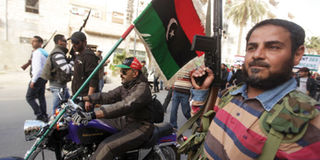Ugandan government to freeze Libyan assets

UNRELENTING: Pro-democracy protestors in Benghazi celebrate yesterday following continued pounding of Gaddafi’s strongholds by coalition forces. PHOTO BY AGENCIES
The government of the Republic of Uganda will impose a freeze on Libyan assets in Uganda although it opposes the West’s military onslaught on the North African country. Presenting a statement in Parliament on Thursday, International Cooperation Minister Okello Oryem said the government will implement the UN-initiated sanctions that include enforcing a travel ban on Col. Muammar Gaddafi.
“All the assets which benefit the Libyan government here in Uganda will be frozen in accordance with the UN resolution,” he said. “We have just one month to enforce the sanctions from the date they were issued (February 26). We have written to the UN Secretary General Ban Ki-moon asking for guidelines on how to implement the sanctions.”
The minister also said the Sanctions Committee chaired by Portugal met in New York yesterday for its first formal meeting to consider and approve the draft guidelines.
Allying fears that some Ugandans employed by a string of Libyan-owned companies could be affected in the process, Mr Oryem said businesses will run normally but the money will be channeled to a special account until the sanctions are lifted.
The Libyan government owns a string of multi-billion companies in Uganda. They include Uganda Telecom Limited, National Housing Construction Company, Tropical Bank, Laico Lake Victoria Hotel, Tamoil East Africa and OilLibya.
Globally, Libya’s assets are registered under the Libya Arab Africa Investment Co (Laaico), a $5 billion undertaking under Libya Oil Holdings, Libya African Investment Portfolio and Libyan Foreign Investment Company (Lafico).
But Mr Oryem puts Libya investments in Uganda at about $375m (Shs862.5 billion), spread over various sectors of the economy. Libya has also demonstrated generosity towards Uganda by way of funding several projects here, most prominent among are the construction of the Gaddafi National Mosque and the renovation of Toro Royal Palace.
As MPs across the political spectrum backed the attack on Gadaffi and accused him of overstaying in power. Mr Oryem, however, reiterated President Museveni’s push for dialogue as a way of solving the current impasse.
“Uganda remains committed to efforts to resolve the current crisis in Libya through dialogue and shall participate actively in the adhoc committee meeting convened (today) in Addis-Ababa,” he said.
“We believe this path and not the path of pursuing a regime change that is advocated in some quarters, remains the best course of action for the Libyan people and for long term peace and stability in the region,” he said.
Libyan government forces have continued to battle pro-democracy activists, who have taken control of most of its eastern part. The uprising seeks to end Gaddafi’s 42-year-old rule and establish democratic reforms.
In a stormy debate that lasted for several hours, MPs including NRM members attacked President Museveni and other African leaders for overstaying in power and warned of serious consequences.
“I condemn anyone who condemns protesters who have been demanding for political reforms which were not adhered to. I am 40 years now, but for a president to stay in power for 43 (sic) years is too much,” said Mr Barnabas Tinkasiimire (Buyaga, NRM).
Arua Woman MP Christine Abia and Chwa MP Livingstone Okello-Okello said Ugandan leaders should draw lessons from Gaddafi’s predicament.
Ms Abia said: “Gaddafi is suffering from Pakalastism (a slogan used during President Museveni’s re-election campaign). We are limiting term limits claiming we are in power pakalast because people like us. People are tired and we should learn from Libya.”
Mr Okello-Okello said: “People who insist on being there pakalast will go pakalost”-- sending the whole House to a laughter.




